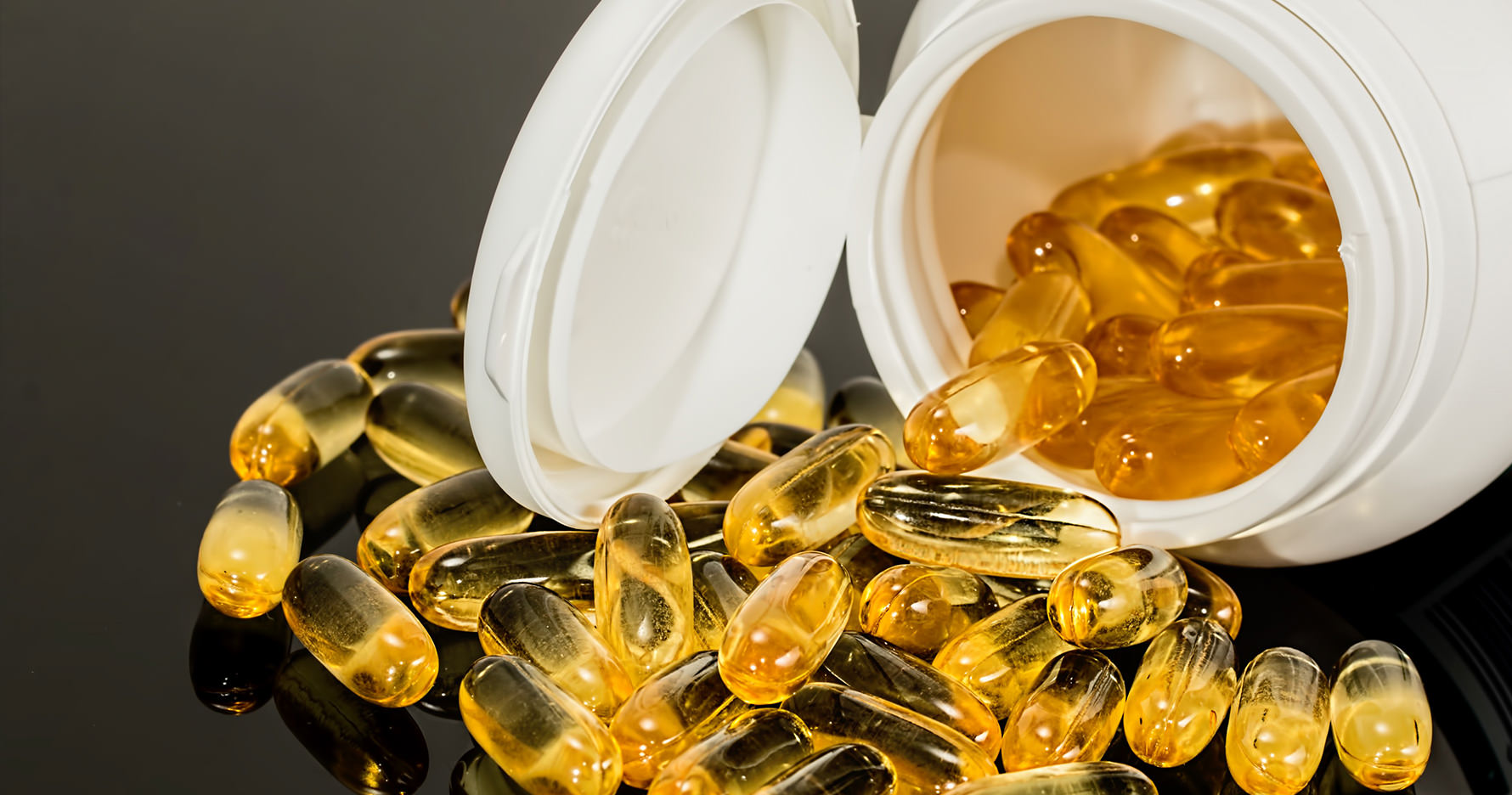Omega-3 fatty acids: a medicine to live longer and improve athletic performance?

Omega-3 is a group of unsaturated fatty acids, which includes the EPA (eicosapentaenoic acid) and DHA (docosahexaenoic acid) fatty acids. Part of these fats cannot be made by the body and thus must be absorbed from your nutritional intake. Fatty fish is one of the most significant sources of this group of fatty acids. Therefore, these fats are often sold under the name ‘fish oil’ or ‘fish fatty acids’. Mackerel, salmon, herring, sardines, and trout are the best types of fish with respect to supplying Omega-3 fatty acids.
Large-scale epidemiological research has shown that the massive consumption of fish in Japan, especially fatty types of fish, is associated with a low mortality rate due to cardiac and vascular diseases. In our Western society, we see the reverse trend. There is an increased incidence of cardiac and vascular diseases in ethnic groups that only consume low amounts of Omega-3 fatty acids. Recent research shows that these apparently ‘healthy fats’ can also be beneficial to athletes.
A variety of positive health effects have been attributed to these fats due to the anti-inflammatory properties of Omega-3. They can help prevent cardiac and vascular diseases and hypertension. A chronic deficiency of Omega-3 increases the chance of inflammatory reactions in the body, which increases the risk of inflammatory health problems such as hypertension. So, it is crucial for many people to increase their consumption of these fatty acids. Intensive exercise, particularly endurance training, increases the chance of inflammation. So, it is useful to assess the relevance of Omega-3 supplements for athletes.
Omega-3 for athletes
In addition to the positive effects of Omega-3 on health, these fats may also contribute to improved athletic performance. Regular intensive exercise results in more minor inflammatory reactions occurring in the body, which is not a problem. This is experienced, for example, as tiredness, muscle pain, and muscle damage. However, these effects are a necessary part of making progress. As the saying goes: “no pain, no gain”. The anti-inflammatory properties of Omega-3 may play a role in preventing or reducing inflammatory reactions. In other words, consuming the right amount of Omega-3 can contribute to the reduction of muscle pain and muscle breakdown, especially in a period of heavy exercise or after an injury.
Recent scientific studies have also shown that Omega-3 stimulates the generation of muscle protein and thus accelerates muscle building and recovery. This does require the daily consumption of the appropriate dose. When recovering from an injury or during a period of immobilisation, it appears beneficial to consume a high dose of an Omega-3 supplement. In addition to this positive effect on muscle function, there are scientific indicators that Omega-3 fatty acids can make a positive contribution to the immune system, lowering the risk of infections in the airways.
Omega-3 fatty acids dosage
To benefit public health, various health organisations recommend the daily consumption of at least 500 mg of the EPA fatty acid and 250 mg of the DHA fatty acid. You can achieve this very easily by eating fatty fish at least once a week and preferably twice a week. If fish is absent from your daily diet, the deficiency of Omega-3 can be compensated by taking a supplement. It is important to realise that an Omega-3 supplement is never a complete replacement for a piece of (fatty) fish. In addition to healthy fats, fish contains many other important nutrients that are not present in a supplement, such as high-quality proteins and vitamin D.
If you engage in intensive exercise, your situation is different from that of your average citizen because athletes strive to achieve specific positive effects with respect to muscle building and recovery. This requires a very high dose of Omega-3 fatty acids, namely, ~3 grams of EPA and ~2 grams of DHA fatty acids each day. It is impossible to achieve this dosage by consuming fish in your normal diet. This would require you to eat 1 to 1.5 kilograms of fish a day, which would immediately result in the consumption of excessive proteins and calories. So, here, the best solution is to take a supplement each day.

In addition to pure Omega-3 supplements, krill oil is becoming increasingly popular as a source of Omega-3 fatty acids. An important difference from an Omega-3 supplement is that krill oil, derived from small shrimp, often has less EPA and DHA than high-quality supplements. Moreover, krill oil also contains high concentrations of antioxidants, which can slow down the beneficial effects of training. Cod liver oil is also rich in Omega-3 fatty acids and so is regularly recommended as a supplement. In addition to Omega-3 fatty acids, cod liver oil also contains very high concentrations of vitamin A, vitamin D and iodine. If you do not have a deficiency in these substances, the consumption of large doses of cod liver oil is not recommended.
One more caution… we previously stated that the consistent consumption of high doses of antioxidants can slow down the beneficial training adaptation in the muscles. After all, oxidative stress is a necessity for making muscles stronger. Analogously, muscle inflammation is a necessity as a stimulus for progression. So, in no case whatsoever do we recommend chronic consumption of the above-mentioned high doses of EPA and DHA during a period of conditional muscle building because it is likely to slow down the desired progression. In the absence of scientific research providing clear recommendations, it seems prudent to limit the consumption of high doses of Omega-3 fatty acids to periods when you are not looking to benefit from training, for example, during very intensive competition periods or during the recovery process after an injury.
Summary
Omega-3 fatty acids are anti-inflammatory and thus contribute to the prevention of heart and vascular diseases and hypertension. Therefore, you should regularly consume fatty fish or take a supplement. The healthy fatty acids can accelerate recuperation and muscle recovery before and after periods of intensive exercise or recovery after an injury. However, this requires a significantly higher daily dose (3 grams of EPA and 2 grams of DHA fatty acids) that can only be achieved by taking a supplement. Currently, there are no arguments (yet) that recommend the chronic consumption of such high doses of Omega-3 in the context of intensive training.
References
-
1. Ruxton CHS, Reed SC, Simpson MJA, Millington KJ.
The health benefits of omega-3 polyunsaturated fatty acids: a review of the evidence.” Journal of Human Nutrition and Dietetics, vol. 17(5), pp. 449–459, 2004.
https://www.ncbi.nlm.nih.gov/pubmed/15357699 -
2. Heaton LE, Davis JK, Rawson ES, Nuccio RP, Witard OC, Stein KW, Baar K.
“Selected In-Season Nutritional Strategies to Enhance Recovery for Team Sport Athletes: A Practical Overview.” Sports Medicine, vol. 47(11), pp. 2201-2218, 2017.
https://doi.org/10.1007/s40279-017-0759-2 -
3. Mickleborough TD.
“Omega-3 fatty acids in physical performance optimalization.” International Journal in Sports Nutrition & Exercise Metabolism, vol. 23(1), pp. 83-96, 2013.
https://www.ncbi.nlm.nih.gov/pubmed/23400626 -
4. Mickleborough TD, Murray RL, Ionescu AA, Lindley MR.
“Fish Oil Supplementation Reduces Severity of Exercise-induced Bronchoconstriction in Elite Athletes.” American Journal of Respiratory and Critical Care Medicine, vol. 168(10), 2003.
https://www.atsjournals.org/doi/abs/10.1164/rccm.200303-373OC -
5. Peoples GE, McLennan PL, Howe PRC, Groeller H.
“Fish Oil Reduces Heart Rate and Oxygen Consumption During Exercise.” Journal of Cardiovascular Pharmacology, vol. 52(6), pp. 540-547, 2008.
https://journals.lww.com/cardiovascularpharm/Abstract/2008/12000/Fish_Oil_Reduces_Heart_Rate_and_Oxygen_Consumption.10.aspx -
6. McGlory C., Gorissen S.H.M., Kamal M., Bahniwal R., Hector A.J., Baker S.K., Chabowski A., Phillips S.M.
“Omega-3 fatty acid supplementation attenuates skeletal muscle disuse atrophy during two weeks of unilateral leg immobilization in healthy young women.” The FASEB Journal, early online, 2019.
https://doi.org/10.1096/fj.201801857RRR


